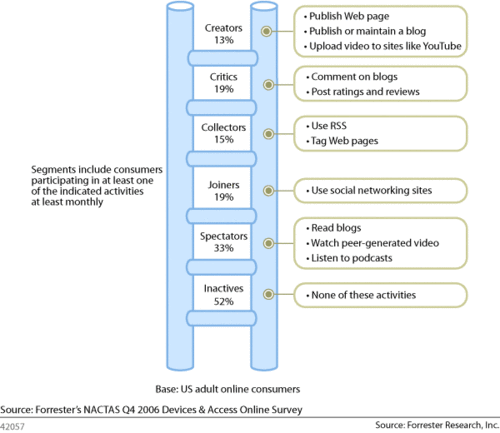In discussing participation in this week’s module, we were shown this graphic of the levels of participation as a ladder:
 [via]
[via]
At first glance, I self-identified near the top of the ladder as a blogger, youtuber, tweeter, goodreader, what have you. As this week has progressed, I’ve found I’ve been more often than not spectating or, more derisively, lurking, which is just above the bottom rung. Stretching this metaphor further, I climb up and down this ladder as it suits me but more or less hang out in the middle. It’s easy to fall back into lurking habits especially in the face of nonstop information flowing through our screens.
Another thing we looked at was the 90-9-1 rule of participation inequality where 90% of online communities are lurking non-contributors. While these percentages has likely improved in the past 5 years, I think this generally still holds true. I had come across this graphic during a spring semester class as I investigated the lack of success in libraries implementing online book clubs. While there are many contributing factors, the inability to overcome participation inequality was the generally the nail in the coffin.
Even something like Bibliocommons, which has all sorts of social media affordances, strikes me as something that will never hit a critical mass of participation like, say, GoodReads. I think sites like Amazon, Wikipedia, and GoodReads are able to overcome participation inequality through sheer numbers of users. If that participation rule holds, even 1% of millions of users will give the appearance of constant activity while an individual library’s members (only a percentage of those being active online anyway) will, again, never hit that critical mass. Bibliocommons attempts to offset this by pooling comments across all Bibliocommons-using libraries, though this still pales in comparison to other more “open” sites for everybody. In fact, the company itself puts it best when they state (as a means of marketing), “The communities of even the largest library systems are small by comparison with those of the online environments that library customers the world over engage with daily to discover, keep track of, and respond to books, movies and music.” While I may be ragging a bit on Bibliocommons here, I admittedly dig its functionality as a catalogue.
So how then do we as libraries foster social participation? Here’s just a random list of words that came to mind, less actionable solutions than qualities that I associate with successful forays into social media (not necessarily libraries):
- authentic
- engaged
- natural
- active
- current
- two-way
- user-focused
Along those lines, I like this 2007 blog post from The Other Librarian:
My Top-ten Library 2.0 “No-brainers” for Public Libraries
Deserving of an update, but still applicable and relevant today, at the very least from a philosophical standpoint about what libraries can/should be doing.
